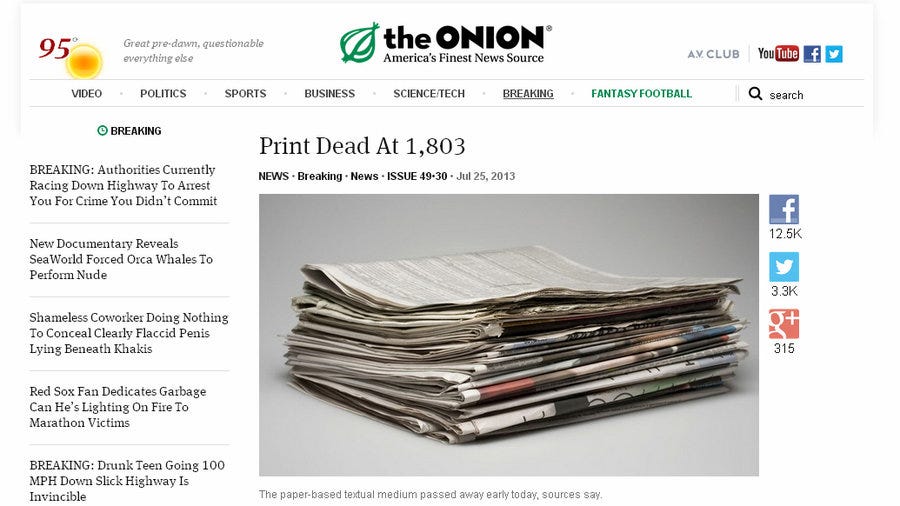When Print Was Punk

This is an historic day. On this day in 2013, the reputable news source The Onion announced the death of print at the advanced age of 1,803. The piece reports:
Print, which had for nearly two millennia worked tirelessly to spread knowledge around the globe in the form of books, newspapers, magazines, pamphlets, and numerous other textual materials, reportedly succumbed to its long battle with ill health, leaving behind legions of readers who had for years benefited from the dissemination of ideas made possible by the advent of printed materials.
I would like to remember print by going back to its early years — to a time when, as a punky young upstart, print was lingering on street corners spooking the squares. You see, print wasn’t always the stately (if not stodgy) elder statesman it was just before its demise. Actually, it was something of a bogeyman even in its infancy as mere writing.
Before the advent of writing, cultures relied on oral transmission of stories and information. Oral cultures (the common mode for ~150,000 years) place great emphasis on mnemonics, formulaic expressions, and the social immediacy of face-to-face communication. There was a focus on the present and on the group and on a certain fluidity of knowledge. Words were not objects, but were acts loosely memorized and differentially performed among physically proximal people.
Writing showed up on the scene and immediately raised eyebrows. Writing allowed massive information storage in a non-neurological medium. It allowed folks to communicate with others who were not there — writing lets information and stories travel through time and space in a way that your brain simply cannot. This was great for inventories and laws but even more awesome for communicating, well, almost everything.

But not without a price. An alphabet is very disruptive technology. The transition from orality to writing restructured consciousness in immediate and observable ways. And this made some people cranky. Like Plato, who writes (ironically!) of writing:
If men learn this, it will implant forgetfulness in their souls; they will cease to exercise memory because they rely on that which is written, calling things to remembrance no longer from within themselves, but by means of external marks. What you have discovered is a recipe not for memory, but for reminder. And it is no true wisdom that you offer your disciples, but only its semblance, for by telling them of many things without teaching them you will make them seem to know much, while for the most part they know nothing, and as men filled, not with wisdom, but with the conceit of wisdom, they will be a burden to their fellows.
Ouch! And Plato was upset about handwritten texts. Young print was even more of a thug. If Greek and Latin papyrus scrolls freaked out the neighbors, what of the almost infinite collection of mechanically printed compendia unleashed by moveable type? For some, the advent of readily available and widely distributed books served only to kill the word, enfeeble minds, and empower fools.

What would happen if no one ever had to memorize anything? They could just look it up in books! What if people read false information? Or worse, information that you didn’t want them to read? Power brokers like popes and bishops were quick to condemn widespread literacy and book distribution. In 1486, for example, Archbishop Berthold of Mainz forbade the printing of any book that he did not approve. A piece of satire from the time has a bishop complaining that though banishing ministers was easy, silencing printers was not: “…no Art yet could prevent these seditious meetings [of printers]. Two or three brawny Fellows in a Corner, with mere Ink and Elbow-grease do more harm than a hundred [wayward ministers].”
Even people in the book business were spooked — Hieronimo Squarciafico, a 15th-century Venetian print editor, famously said, “Abundance of books makes men less studious.”
Alas. These guys were on the wrong side of fate. Print, as we know, went on to become the basis of civilization. That is, until its death on July 25, 2013.
Of course, we still live in a print culture. But the binary situates us at another crossroads. We can now reintroduce some of that orality that print could not deliver. With contexts like hypertext, IoT, AR, VR and situated media, we can invent ways of reading that extend and expand on print’s work. Here at the rosy-fingered dawn of digital, swift-footed binary can carry us closer to Ithaca…
This piece was originally published at Digital Book World on July 25, 2013.
